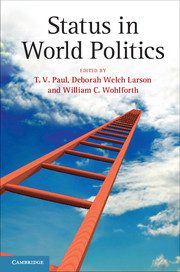Book contents
- Frontmatter
- Contents
- Figures
- Tables
- Contributors
- Acknowledgments
- Part I Introduction
- Part II Admission into the Great-Power Club
- 2 Managing Rising Powers: The Role of Status Concerns
- 3 Status Considerations in International Politics and the Rise of Regional Powers
- 4 Status Is Cultural: Durkheimian Poles and Weberian Russians Seek Great-Power Status
- Part III Status Signaling
- Part IV International Institutions and Status
- Part V Status, Authority, and Structure
- Part VI Conclusions
- Index
- References
4 - Status Is Cultural: Durkheimian Poles and Weberian Russians Seek Great-Power Status
Published online by Cambridge University Press: 05 June 2014
- Frontmatter
- Contents
- Figures
- Tables
- Contributors
- Acknowledgments
- Part I Introduction
- Part II Admission into the Great-Power Club
- 2 Managing Rising Powers: The Role of Status Concerns
- 3 Status Considerations in International Politics and the Rise of Regional Powers
- 4 Status Is Cultural: Durkheimian Poles and Weberian Russians Seek Great-Power Status
- Part III Status Signaling
- Part IV International Institutions and Status
- Part V Status, Authority, and Structure
- Part VI Conclusions
- Index
- References
Summary
Like its etymological twin − the state, status emerges within a specific cultural context or, to better capture the importance of relations between polities, a civilizational context. According to Durkheim and Mauss, “[a] civilization constitutes a kind of moral milieu encompassing a certain number of nations, each national culture being only a particular form of the whole.” Status-seeking between any groups of polities takes place in a specific social context. What Durkheim and Mauss had in mind was Christendom.
The historical fact that the state system grew out of Christendom and a Christian legal code (first ius gentium, then ius inter gentes) has repercussions not only for those left status-less, but also for how status was conferred within the system. Conflict over status played itself out as a discussion of which king was closest to God. Earthly powers were ordered in a hierarchy of descending closeness to God, with France on top, then other Christian rulers, then non-Christian rulers (and, we may add, people who were seen to be without rulers altogether). This hierarchical order carried over into early modernity and beyond, most recently as a “standard of civilization.”
- Type
- Chapter
- Information
- Status in World Politics , pp. 85 - 112Publisher: Cambridge University PressPrint publication year: 2014
References
- 27
- Cited by



